Comprehensive Report: Legal Aspects of International Trade for HSBC
VerifiedAdded on 2023/03/17
|10
|2733
|59
Report
AI Summary
This report provides an executive summary and detailed analysis of the legal aspects of international trade and enterprise, specifically focusing on HSBC's operations. It examines the legislative regulatory framework applicable to the banking sector in Australia, including banking policies, the Competition and Consumer Act 2010, taxation policies, and the Fair Work Act 2009. Furthermore, it explores the impact of various treaties, conventions, and agreements, such as the ASEAN Australia New Zealand Free Trade Area (AANZFTA), the 2003 Australia-UK Double Taxation Convention, the China Australia Free Trade Agreement (ChAFTA), and the Paris Agreement, on HSBC's international business. The report highlights how HSBC must navigate these legal provisions to ensure compliance and avoid penalties, emphasizing the importance of understanding and adhering to both domestic and international regulations in its global operations. The report concludes by summarizing the key legal considerations for HSBC's continued success in the international market.
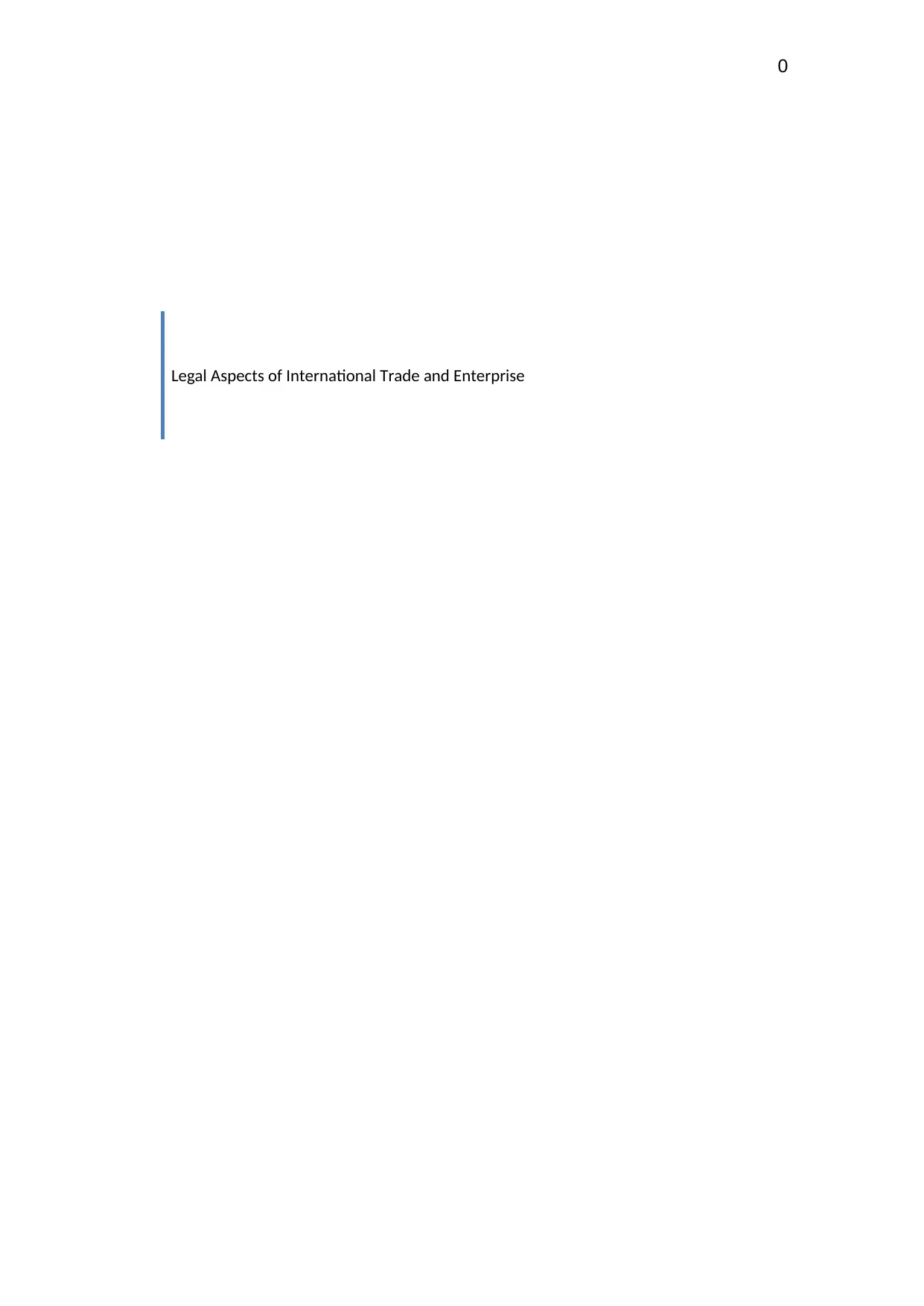
0
Legal Aspects of International Trade and Enterprise
Legal Aspects of International Trade and Enterprise
Paraphrase This Document
Need a fresh take? Get an instant paraphrase of this document with our AI Paraphraser
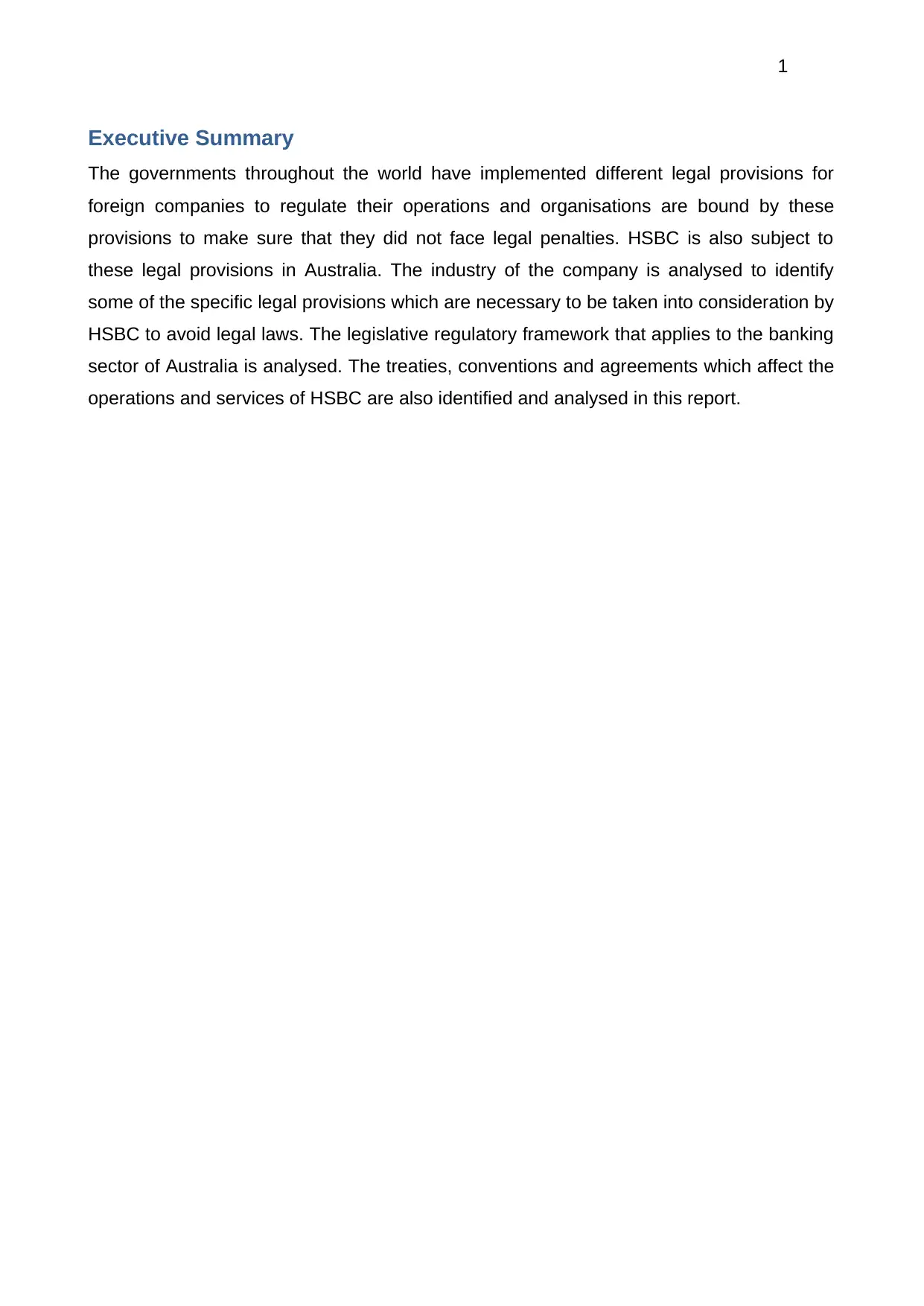
1
Executive Summary
The governments throughout the world have implemented different legal provisions for
foreign companies to regulate their operations and organisations are bound by these
provisions to make sure that they did not face legal penalties. HSBC is also subject to
these legal provisions in Australia. The industry of the company is analysed to identify
some of the specific legal provisions which are necessary to be taken into consideration by
HSBC to avoid legal laws. The legislative regulatory framework that applies to the banking
sector of Australia is analysed. The treaties, conventions and agreements which affect the
operations and services of HSBC are also identified and analysed in this report.
Executive Summary
The governments throughout the world have implemented different legal provisions for
foreign companies to regulate their operations and organisations are bound by these
provisions to make sure that they did not face legal penalties. HSBC is also subject to
these legal provisions in Australia. The industry of the company is analysed to identify
some of the specific legal provisions which are necessary to be taken into consideration by
HSBC to avoid legal laws. The legislative regulatory framework that applies to the banking
sector of Australia is analysed. The treaties, conventions and agreements which affect the
operations and services of HSBC are also identified and analysed in this report.
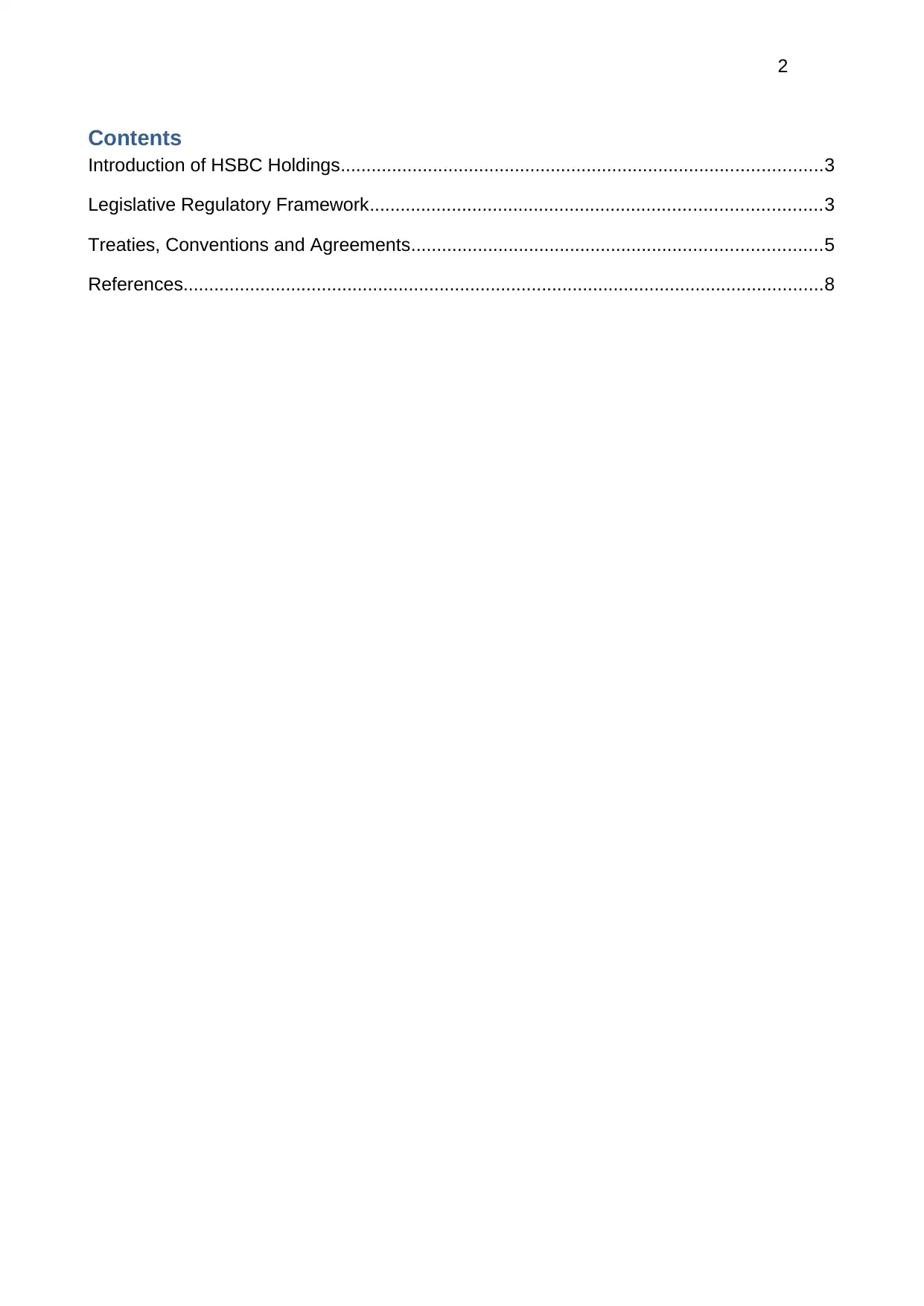
2
Contents
Introduction of HSBC Holdings..............................................................................................3
Legislative Regulatory Framework........................................................................................3
Treaties, Conventions and Agreements................................................................................5
References.............................................................................................................................8
Contents
Introduction of HSBC Holdings..............................................................................................3
Legislative Regulatory Framework........................................................................................3
Treaties, Conventions and Agreements................................................................................5
References.............................................................................................................................8
⊘ This is a preview!⊘
Do you want full access?
Subscribe today to unlock all pages.

Trusted by 1+ million students worldwide
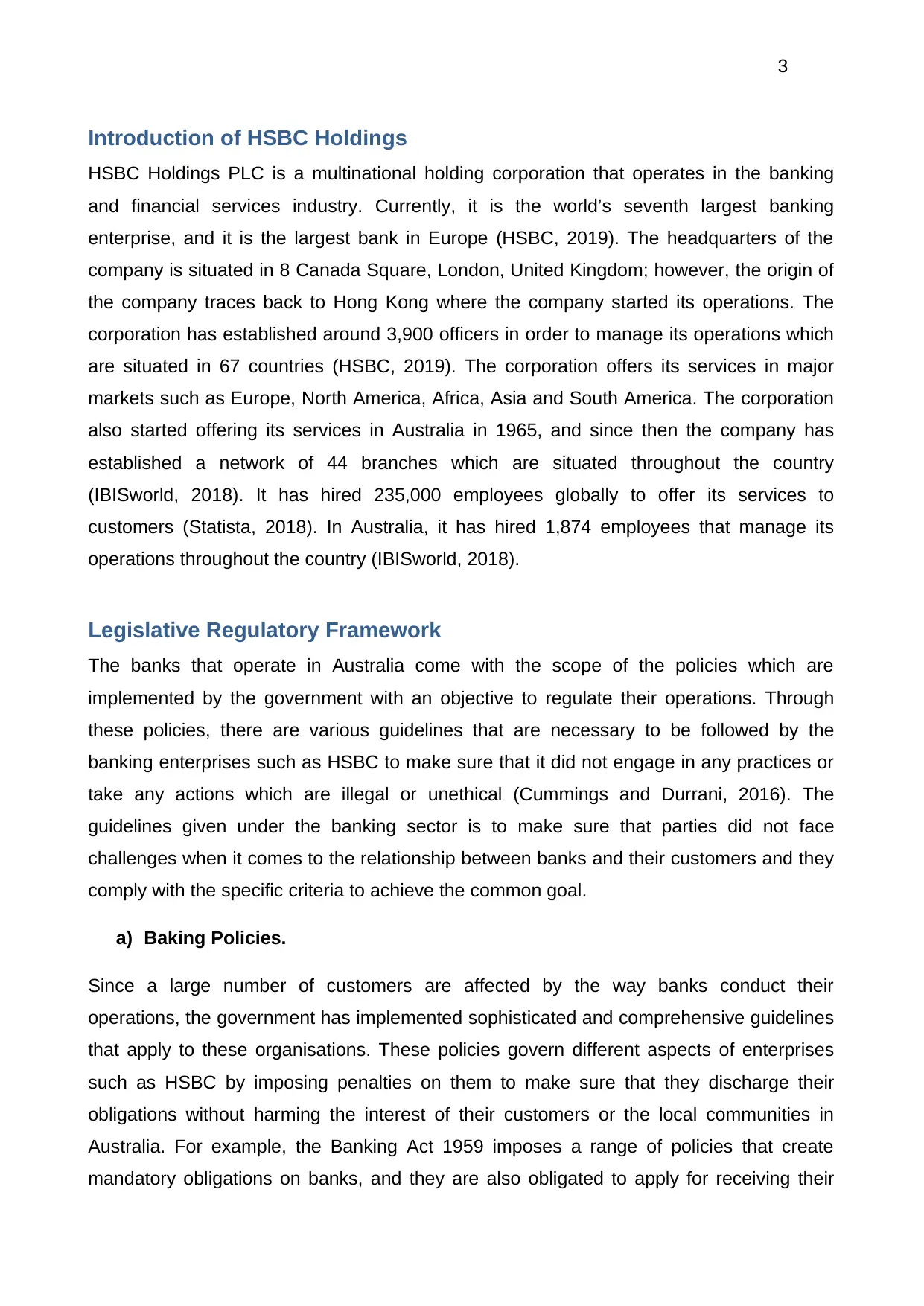
3
Introduction of HSBC Holdings
HSBC Holdings PLC is a multinational holding corporation that operates in the banking
and financial services industry. Currently, it is the world’s seventh largest banking
enterprise, and it is the largest bank in Europe (HSBC, 2019). The headquarters of the
company is situated in 8 Canada Square, London, United Kingdom; however, the origin of
the company traces back to Hong Kong where the company started its operations. The
corporation has established around 3,900 officers in order to manage its operations which
are situated in 67 countries (HSBC, 2019). The corporation offers its services in major
markets such as Europe, North America, Africa, Asia and South America. The corporation
also started offering its services in Australia in 1965, and since then the company has
established a network of 44 branches which are situated throughout the country
(IBISworld, 2018). It has hired 235,000 employees globally to offer its services to
customers (Statista, 2018). In Australia, it has hired 1,874 employees that manage its
operations throughout the country (IBISworld, 2018).
Legislative Regulatory Framework
The banks that operate in Australia come with the scope of the policies which are
implemented by the government with an objective to regulate their operations. Through
these policies, there are various guidelines that are necessary to be followed by the
banking enterprises such as HSBC to make sure that it did not engage in any practices or
take any actions which are illegal or unethical (Cummings and Durrani, 2016). The
guidelines given under the banking sector is to make sure that parties did not face
challenges when it comes to the relationship between banks and their customers and they
comply with the specific criteria to achieve the common goal.
a) Baking Policies.
Since a large number of customers are affected by the way banks conduct their
operations, the government has implemented sophisticated and comprehensive guidelines
that apply to these organisations. These policies govern different aspects of enterprises
such as HSBC by imposing penalties on them to make sure that they discharge their
obligations without harming the interest of their customers or the local communities in
Australia. For example, the Banking Act 1959 imposes a range of policies that create
mandatory obligations on banks, and they are also obligated to apply for receiving their
Introduction of HSBC Holdings
HSBC Holdings PLC is a multinational holding corporation that operates in the banking
and financial services industry. Currently, it is the world’s seventh largest banking
enterprise, and it is the largest bank in Europe (HSBC, 2019). The headquarters of the
company is situated in 8 Canada Square, London, United Kingdom; however, the origin of
the company traces back to Hong Kong where the company started its operations. The
corporation has established around 3,900 officers in order to manage its operations which
are situated in 67 countries (HSBC, 2019). The corporation offers its services in major
markets such as Europe, North America, Africa, Asia and South America. The corporation
also started offering its services in Australia in 1965, and since then the company has
established a network of 44 branches which are situated throughout the country
(IBISworld, 2018). It has hired 235,000 employees globally to offer its services to
customers (Statista, 2018). In Australia, it has hired 1,874 employees that manage its
operations throughout the country (IBISworld, 2018).
Legislative Regulatory Framework
The banks that operate in Australia come with the scope of the policies which are
implemented by the government with an objective to regulate their operations. Through
these policies, there are various guidelines that are necessary to be followed by the
banking enterprises such as HSBC to make sure that it did not engage in any practices or
take any actions which are illegal or unethical (Cummings and Durrani, 2016). The
guidelines given under the banking sector is to make sure that parties did not face
challenges when it comes to the relationship between banks and their customers and they
comply with the specific criteria to achieve the common goal.
a) Baking Policies.
Since a large number of customers are affected by the way banks conduct their
operations, the government has implemented sophisticated and comprehensive guidelines
that apply to these organisations. These policies govern different aspects of enterprises
such as HSBC by imposing penalties on them to make sure that they discharge their
obligations without harming the interest of their customers or the local communities in
Australia. For example, the Banking Act 1959 imposes a range of policies that create
mandatory obligations on banks, and they are also obligated to apply for receiving their
Paraphrase This Document
Need a fresh take? Get an instant paraphrase of this document with our AI Paraphraser
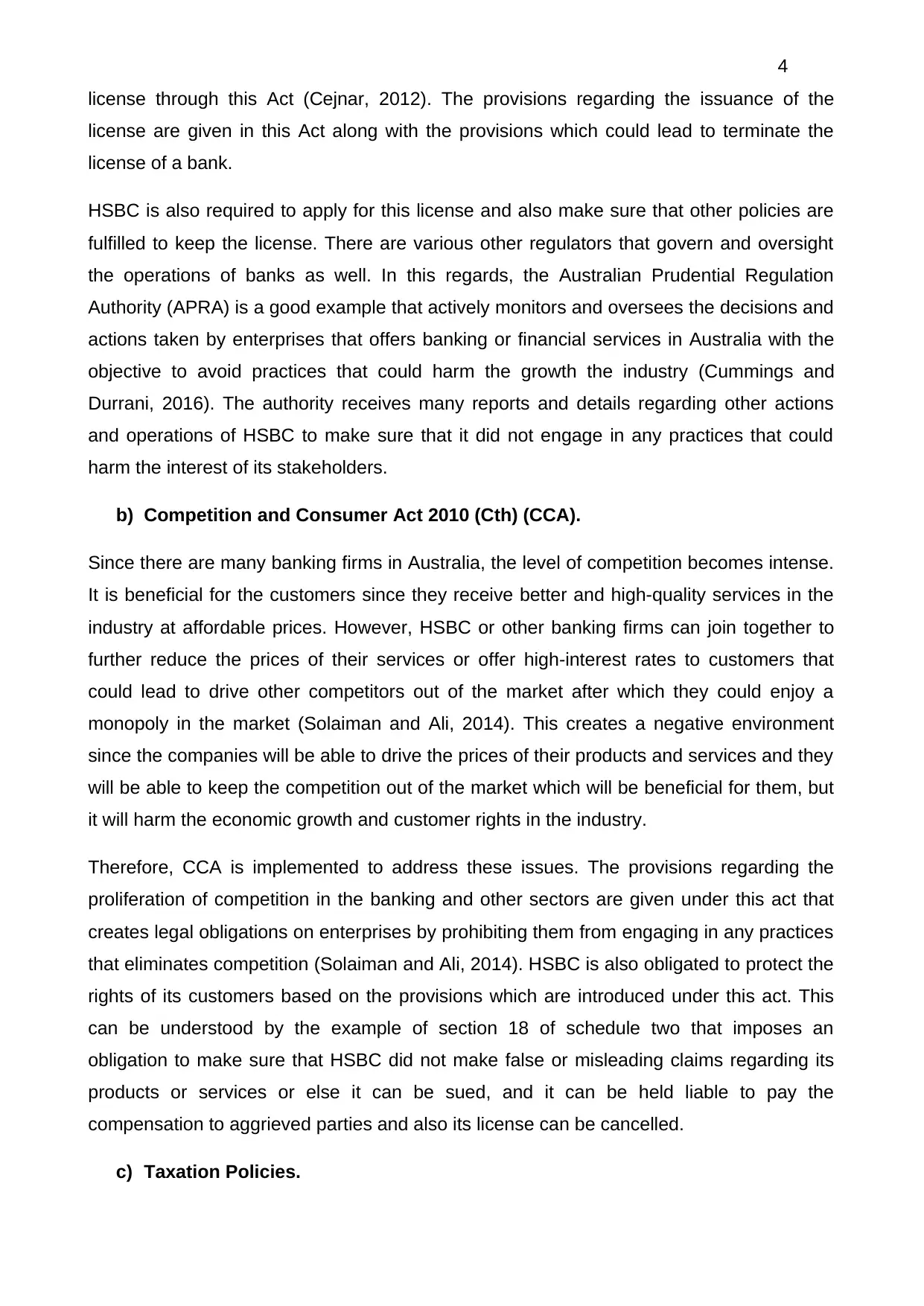
4
license through this Act (Cejnar, 2012). The provisions regarding the issuance of the
license are given in this Act along with the provisions which could lead to terminate the
license of a bank.
HSBC is also required to apply for this license and also make sure that other policies are
fulfilled to keep the license. There are various other regulators that govern and oversight
the operations of banks as well. In this regards, the Australian Prudential Regulation
Authority (APRA) is a good example that actively monitors and oversees the decisions and
actions taken by enterprises that offers banking or financial services in Australia with the
objective to avoid practices that could harm the growth the industry (Cummings and
Durrani, 2016). The authority receives many reports and details regarding other actions
and operations of HSBC to make sure that it did not engage in any practices that could
harm the interest of its stakeholders.
b) Competition and Consumer Act 2010 (Cth) (CCA).
Since there are many banking firms in Australia, the level of competition becomes intense.
It is beneficial for the customers since they receive better and high-quality services in the
industry at affordable prices. However, HSBC or other banking firms can join together to
further reduce the prices of their services or offer high-interest rates to customers that
could lead to drive other competitors out of the market after which they could enjoy a
monopoly in the market (Solaiman and Ali, 2014). This creates a negative environment
since the companies will be able to drive the prices of their products and services and they
will be able to keep the competition out of the market which will be beneficial for them, but
it will harm the economic growth and customer rights in the industry.
Therefore, CCA is implemented to address these issues. The provisions regarding the
proliferation of competition in the banking and other sectors are given under this act that
creates legal obligations on enterprises by prohibiting them from engaging in any practices
that eliminates competition (Solaiman and Ali, 2014). HSBC is also obligated to protect the
rights of its customers based on the provisions which are introduced under this act. This
can be understood by the example of section 18 of schedule two that imposes an
obligation to make sure that HSBC did not make false or misleading claims regarding its
products or services or else it can be sued, and it can be held liable to pay the
compensation to aggrieved parties and also its license can be cancelled.
c) Taxation Policies.
license through this Act (Cejnar, 2012). The provisions regarding the issuance of the
license are given in this Act along with the provisions which could lead to terminate the
license of a bank.
HSBC is also required to apply for this license and also make sure that other policies are
fulfilled to keep the license. There are various other regulators that govern and oversight
the operations of banks as well. In this regards, the Australian Prudential Regulation
Authority (APRA) is a good example that actively monitors and oversees the decisions and
actions taken by enterprises that offers banking or financial services in Australia with the
objective to avoid practices that could harm the growth the industry (Cummings and
Durrani, 2016). The authority receives many reports and details regarding other actions
and operations of HSBC to make sure that it did not engage in any practices that could
harm the interest of its stakeholders.
b) Competition and Consumer Act 2010 (Cth) (CCA).
Since there are many banking firms in Australia, the level of competition becomes intense.
It is beneficial for the customers since they receive better and high-quality services in the
industry at affordable prices. However, HSBC or other banking firms can join together to
further reduce the prices of their services or offer high-interest rates to customers that
could lead to drive other competitors out of the market after which they could enjoy a
monopoly in the market (Solaiman and Ali, 2014). This creates a negative environment
since the companies will be able to drive the prices of their products and services and they
will be able to keep the competition out of the market which will be beneficial for them, but
it will harm the economic growth and customer rights in the industry.
Therefore, CCA is implemented to address these issues. The provisions regarding the
proliferation of competition in the banking and other sectors are given under this act that
creates legal obligations on enterprises by prohibiting them from engaging in any practices
that eliminates competition (Solaiman and Ali, 2014). HSBC is also obligated to protect the
rights of its customers based on the provisions which are introduced under this act. This
can be understood by the example of section 18 of schedule two that imposes an
obligation to make sure that HSBC did not make false or misleading claims regarding its
products or services or else it can be sued, and it can be held liable to pay the
compensation to aggrieved parties and also its license can be cancelled.
c) Taxation Policies.
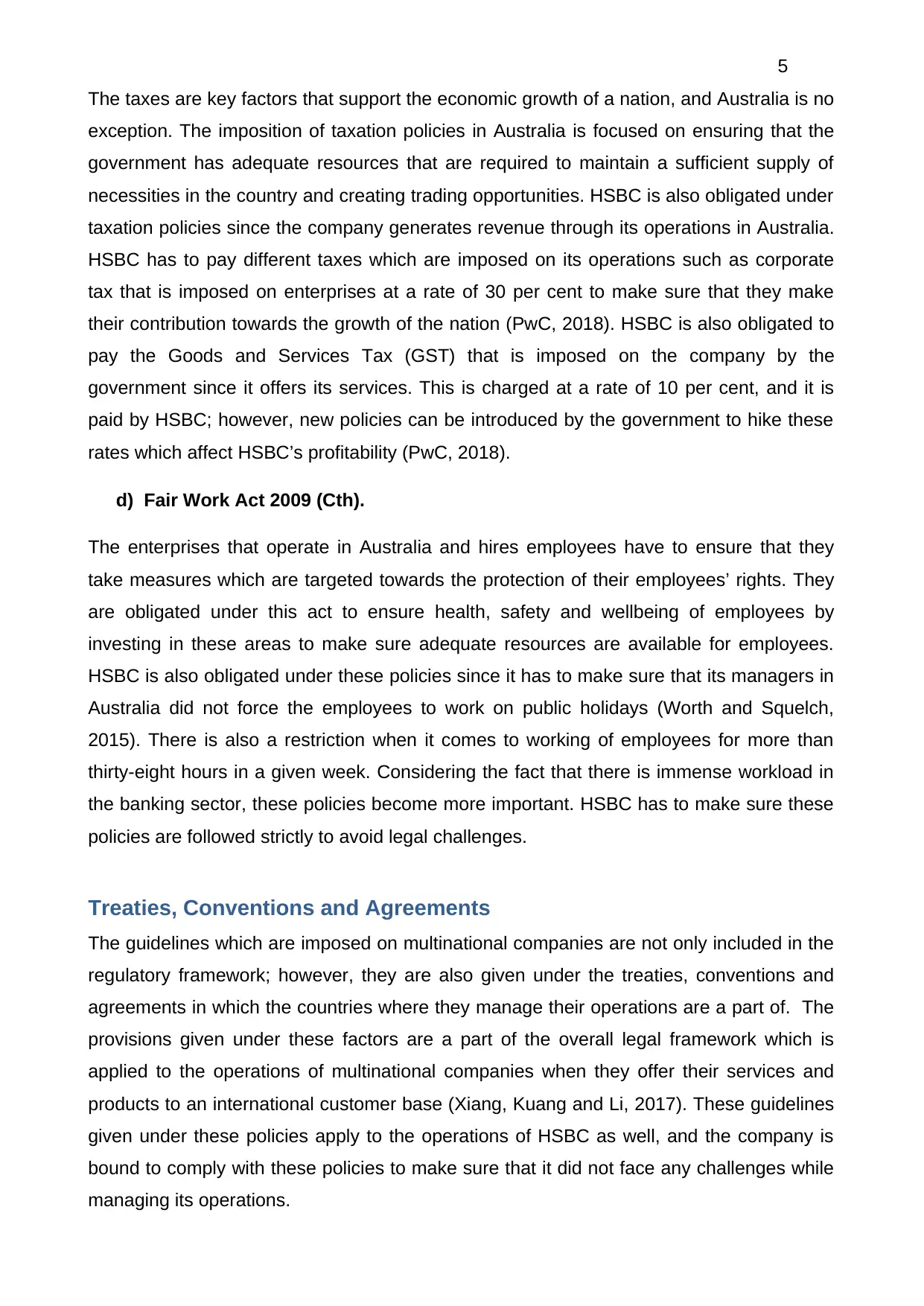
5
The taxes are key factors that support the economic growth of a nation, and Australia is no
exception. The imposition of taxation policies in Australia is focused on ensuring that the
government has adequate resources that are required to maintain a sufficient supply of
necessities in the country and creating trading opportunities. HSBC is also obligated under
taxation policies since the company generates revenue through its operations in Australia.
HSBC has to pay different taxes which are imposed on its operations such as corporate
tax that is imposed on enterprises at a rate of 30 per cent to make sure that they make
their contribution towards the growth of the nation (PwC, 2018). HSBC is also obligated to
pay the Goods and Services Tax (GST) that is imposed on the company by the
government since it offers its services. This is charged at a rate of 10 per cent, and it is
paid by HSBC; however, new policies can be introduced by the government to hike these
rates which affect HSBC’s profitability (PwC, 2018).
d) Fair Work Act 2009 (Cth).
The enterprises that operate in Australia and hires employees have to ensure that they
take measures which are targeted towards the protection of their employees’ rights. They
are obligated under this act to ensure health, safety and wellbeing of employees by
investing in these areas to make sure adequate resources are available for employees.
HSBC is also obligated under these policies since it has to make sure that its managers in
Australia did not force the employees to work on public holidays (Worth and Squelch,
2015). There is also a restriction when it comes to working of employees for more than
thirty-eight hours in a given week. Considering the fact that there is immense workload in
the banking sector, these policies become more important. HSBC has to make sure these
policies are followed strictly to avoid legal challenges.
Treaties, Conventions and Agreements
The guidelines which are imposed on multinational companies are not only included in the
regulatory framework; however, they are also given under the treaties, conventions and
agreements in which the countries where they manage their operations are a part of. The
provisions given under these factors are a part of the overall legal framework which is
applied to the operations of multinational companies when they offer their services and
products to an international customer base (Xiang, Kuang and Li, 2017). These guidelines
given under these policies apply to the operations of HSBC as well, and the company is
bound to comply with these policies to make sure that it did not face any challenges while
managing its operations.
The taxes are key factors that support the economic growth of a nation, and Australia is no
exception. The imposition of taxation policies in Australia is focused on ensuring that the
government has adequate resources that are required to maintain a sufficient supply of
necessities in the country and creating trading opportunities. HSBC is also obligated under
taxation policies since the company generates revenue through its operations in Australia.
HSBC has to pay different taxes which are imposed on its operations such as corporate
tax that is imposed on enterprises at a rate of 30 per cent to make sure that they make
their contribution towards the growth of the nation (PwC, 2018). HSBC is also obligated to
pay the Goods and Services Tax (GST) that is imposed on the company by the
government since it offers its services. This is charged at a rate of 10 per cent, and it is
paid by HSBC; however, new policies can be introduced by the government to hike these
rates which affect HSBC’s profitability (PwC, 2018).
d) Fair Work Act 2009 (Cth).
The enterprises that operate in Australia and hires employees have to ensure that they
take measures which are targeted towards the protection of their employees’ rights. They
are obligated under this act to ensure health, safety and wellbeing of employees by
investing in these areas to make sure adequate resources are available for employees.
HSBC is also obligated under these policies since it has to make sure that its managers in
Australia did not force the employees to work on public holidays (Worth and Squelch,
2015). There is also a restriction when it comes to working of employees for more than
thirty-eight hours in a given week. Considering the fact that there is immense workload in
the banking sector, these policies become more important. HSBC has to make sure these
policies are followed strictly to avoid legal challenges.
Treaties, Conventions and Agreements
The guidelines which are imposed on multinational companies are not only included in the
regulatory framework; however, they are also given under the treaties, conventions and
agreements in which the countries where they manage their operations are a part of. The
provisions given under these factors are a part of the overall legal framework which is
applied to the operations of multinational companies when they offer their services and
products to an international customer base (Xiang, Kuang and Li, 2017). These guidelines
given under these policies apply to the operations of HSBC as well, and the company is
bound to comply with these policies to make sure that it did not face any challenges while
managing its operations.
⊘ This is a preview!⊘
Do you want full access?
Subscribe today to unlock all pages.

Trusted by 1+ million students worldwide
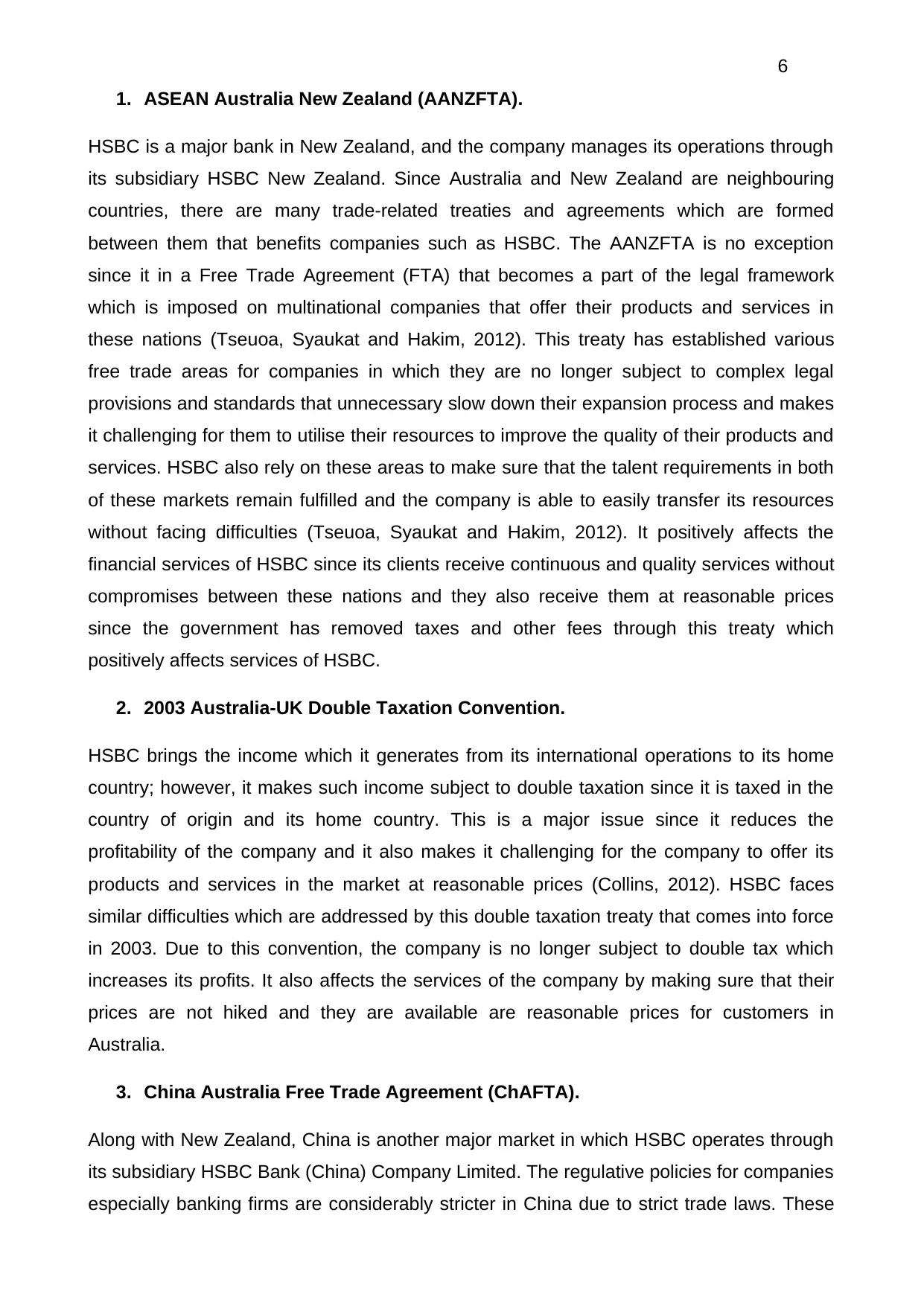
6
1. ASEAN Australia New Zealand (AANZFTA).
HSBC is a major bank in New Zealand, and the company manages its operations through
its subsidiary HSBC New Zealand. Since Australia and New Zealand are neighbouring
countries, there are many trade-related treaties and agreements which are formed
between them that benefits companies such as HSBC. The AANZFTA is no exception
since it in a Free Trade Agreement (FTA) that becomes a part of the legal framework
which is imposed on multinational companies that offer their products and services in
these nations (Tseuoa, Syaukat and Hakim, 2012). This treaty has established various
free trade areas for companies in which they are no longer subject to complex legal
provisions and standards that unnecessary slow down their expansion process and makes
it challenging for them to utilise their resources to improve the quality of their products and
services. HSBC also rely on these areas to make sure that the talent requirements in both
of these markets remain fulfilled and the company is able to easily transfer its resources
without facing difficulties (Tseuoa, Syaukat and Hakim, 2012). It positively affects the
financial services of HSBC since its clients receive continuous and quality services without
compromises between these nations and they also receive them at reasonable prices
since the government has removed taxes and other fees through this treaty which
positively affects services of HSBC.
2. 2003 Australia-UK Double Taxation Convention.
HSBC brings the income which it generates from its international operations to its home
country; however, it makes such income subject to double taxation since it is taxed in the
country of origin and its home country. This is a major issue since it reduces the
profitability of the company and it also makes it challenging for the company to offer its
products and services in the market at reasonable prices (Collins, 2012). HSBC faces
similar difficulties which are addressed by this double taxation treaty that comes into force
in 2003. Due to this convention, the company is no longer subject to double tax which
increases its profits. It also affects the services of the company by making sure that their
prices are not hiked and they are available are reasonable prices for customers in
Australia.
3. China Australia Free Trade Agreement (ChAFTA).
Along with New Zealand, China is another major market in which HSBC operates through
its subsidiary HSBC Bank (China) Company Limited. The regulative policies for companies
especially banking firms are considerably stricter in China due to strict trade laws. These
1. ASEAN Australia New Zealand (AANZFTA).
HSBC is a major bank in New Zealand, and the company manages its operations through
its subsidiary HSBC New Zealand. Since Australia and New Zealand are neighbouring
countries, there are many trade-related treaties and agreements which are formed
between them that benefits companies such as HSBC. The AANZFTA is no exception
since it in a Free Trade Agreement (FTA) that becomes a part of the legal framework
which is imposed on multinational companies that offer their products and services in
these nations (Tseuoa, Syaukat and Hakim, 2012). This treaty has established various
free trade areas for companies in which they are no longer subject to complex legal
provisions and standards that unnecessary slow down their expansion process and makes
it challenging for them to utilise their resources to improve the quality of their products and
services. HSBC also rely on these areas to make sure that the talent requirements in both
of these markets remain fulfilled and the company is able to easily transfer its resources
without facing difficulties (Tseuoa, Syaukat and Hakim, 2012). It positively affects the
financial services of HSBC since its clients receive continuous and quality services without
compromises between these nations and they also receive them at reasonable prices
since the government has removed taxes and other fees through this treaty which
positively affects services of HSBC.
2. 2003 Australia-UK Double Taxation Convention.
HSBC brings the income which it generates from its international operations to its home
country; however, it makes such income subject to double taxation since it is taxed in the
country of origin and its home country. This is a major issue since it reduces the
profitability of the company and it also makes it challenging for the company to offer its
products and services in the market at reasonable prices (Collins, 2012). HSBC faces
similar difficulties which are addressed by this double taxation treaty that comes into force
in 2003. Due to this convention, the company is no longer subject to double tax which
increases its profits. It also affects the services of the company by making sure that their
prices are not hiked and they are available are reasonable prices for customers in
Australia.
3. China Australia Free Trade Agreement (ChAFTA).
Along with New Zealand, China is another major market in which HSBC operates through
its subsidiary HSBC Bank (China) Company Limited. The regulative policies for companies
especially banking firms are considerably stricter in China due to strict trade laws. These
Paraphrase This Document
Need a fresh take? Get an instant paraphrase of this document with our AI Paraphraser
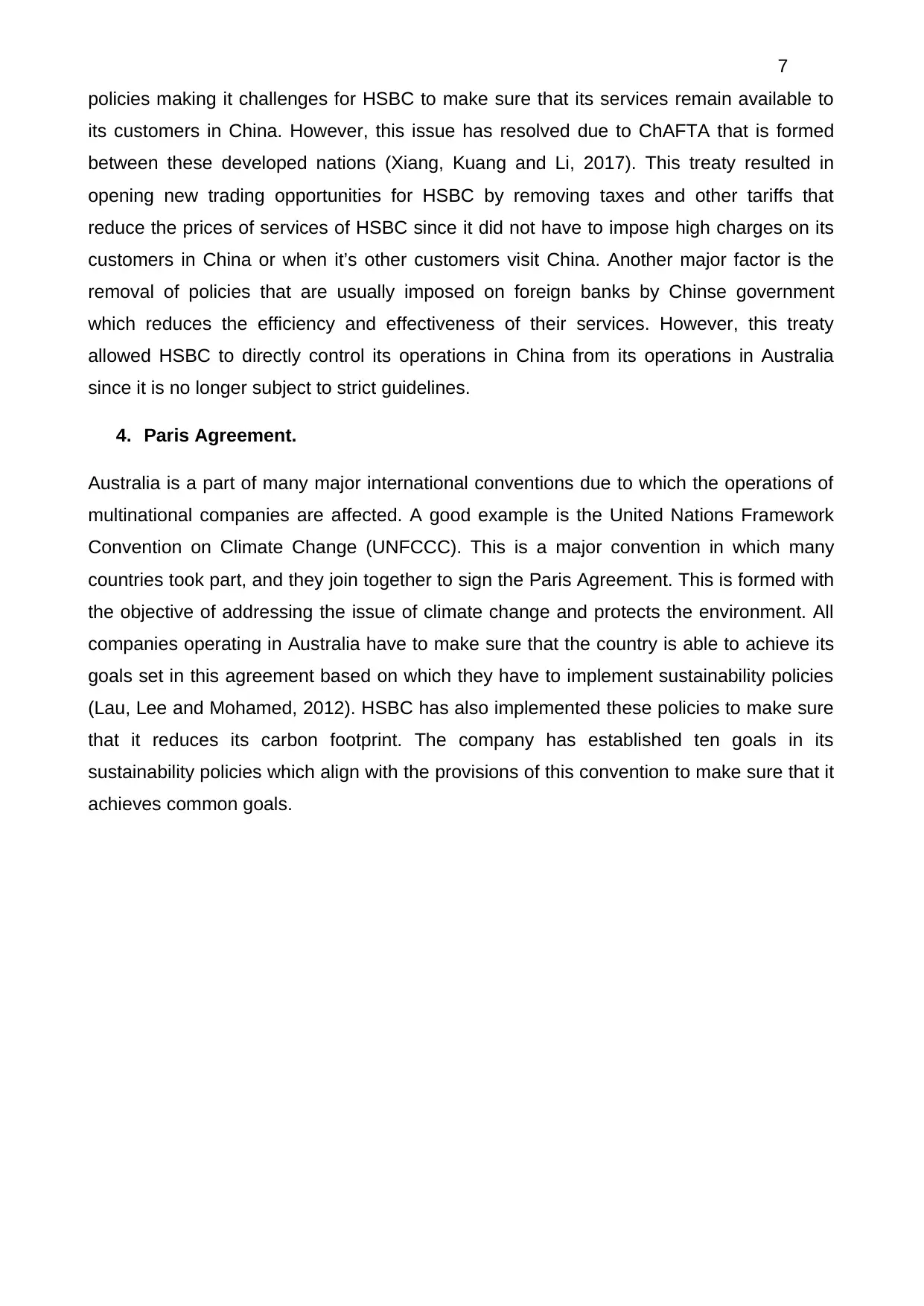
7
policies making it challenges for HSBC to make sure that its services remain available to
its customers in China. However, this issue has resolved due to ChAFTA that is formed
between these developed nations (Xiang, Kuang and Li, 2017). This treaty resulted in
opening new trading opportunities for HSBC by removing taxes and other tariffs that
reduce the prices of services of HSBC since it did not have to impose high charges on its
customers in China or when it’s other customers visit China. Another major factor is the
removal of policies that are usually imposed on foreign banks by Chinse government
which reduces the efficiency and effectiveness of their services. However, this treaty
allowed HSBC to directly control its operations in China from its operations in Australia
since it is no longer subject to strict guidelines.
4. Paris Agreement.
Australia is a part of many major international conventions due to which the operations of
multinational companies are affected. A good example is the United Nations Framework
Convention on Climate Change (UNFCCC). This is a major convention in which many
countries took part, and they join together to sign the Paris Agreement. This is formed with
the objective of addressing the issue of climate change and protects the environment. All
companies operating in Australia have to make sure that the country is able to achieve its
goals set in this agreement based on which they have to implement sustainability policies
(Lau, Lee and Mohamed, 2012). HSBC has also implemented these policies to make sure
that it reduces its carbon footprint. The company has established ten goals in its
sustainability policies which align with the provisions of this convention to make sure that it
achieves common goals.
policies making it challenges for HSBC to make sure that its services remain available to
its customers in China. However, this issue has resolved due to ChAFTA that is formed
between these developed nations (Xiang, Kuang and Li, 2017). This treaty resulted in
opening new trading opportunities for HSBC by removing taxes and other tariffs that
reduce the prices of services of HSBC since it did not have to impose high charges on its
customers in China or when it’s other customers visit China. Another major factor is the
removal of policies that are usually imposed on foreign banks by Chinse government
which reduces the efficiency and effectiveness of their services. However, this treaty
allowed HSBC to directly control its operations in China from its operations in Australia
since it is no longer subject to strict guidelines.
4. Paris Agreement.
Australia is a part of many major international conventions due to which the operations of
multinational companies are affected. A good example is the United Nations Framework
Convention on Climate Change (UNFCCC). This is a major convention in which many
countries took part, and they join together to sign the Paris Agreement. This is formed with
the objective of addressing the issue of climate change and protects the environment. All
companies operating in Australia have to make sure that the country is able to achieve its
goals set in this agreement based on which they have to implement sustainability policies
(Lau, Lee and Mohamed, 2012). HSBC has also implemented these policies to make sure
that it reduces its carbon footprint. The company has established ten goals in its
sustainability policies which align with the provisions of this convention to make sure that it
achieves common goals.
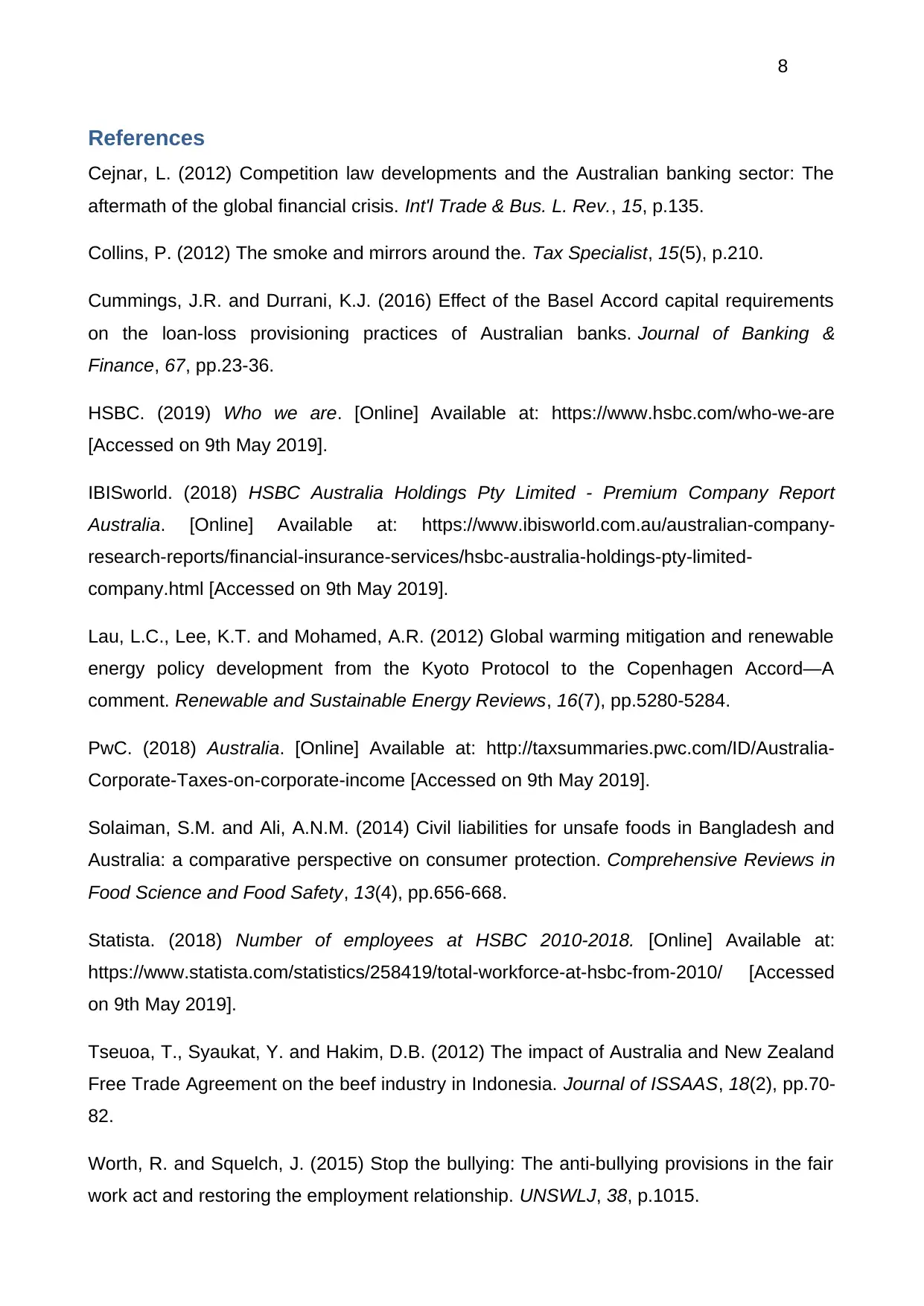
8
References
Cejnar, L. (2012) Competition law developments and the Australian banking sector: The
aftermath of the global financial crisis. Int'l Trade & Bus. L. Rev., 15, p.135.
Collins, P. (2012) The smoke and mirrors around the. Tax Specialist, 15(5), p.210.
Cummings, J.R. and Durrani, K.J. (2016) Effect of the Basel Accord capital requirements
on the loan-loss provisioning practices of Australian banks. Journal of Banking &
Finance, 67, pp.23-36.
HSBC. (2019) Who we are. [Online] Available at: https://www.hsbc.com/who-we-are
[Accessed on 9th May 2019].
IBISworld. (2018) HSBC Australia Holdings Pty Limited - Premium Company Report
Australia. [Online] Available at: https://www.ibisworld.com.au/australian-company-
research-reports/financial-insurance-services/hsbc-australia-holdings-pty-limited-
company.html [Accessed on 9th May 2019].
Lau, L.C., Lee, K.T. and Mohamed, A.R. (2012) Global warming mitigation and renewable
energy policy development from the Kyoto Protocol to the Copenhagen Accord—A
comment. Renewable and Sustainable Energy Reviews, 16(7), pp.5280-5284.
PwC. (2018) Australia. [Online] Available at: http://taxsummaries.pwc.com/ID/Australia-
Corporate-Taxes-on-corporate-income [Accessed on 9th May 2019].
Solaiman, S.M. and Ali, A.N.M. (2014) Civil liabilities for unsafe foods in Bangladesh and
Australia: a comparative perspective on consumer protection. Comprehensive Reviews in
Food Science and Food Safety, 13(4), pp.656-668.
Statista. (2018) Number of employees at HSBC 2010-2018. [Online] Available at:
https://www.statista.com/statistics/258419/total-workforce-at-hsbc-from-2010/ [Accessed
on 9th May 2019].
Tseuoa, T., Syaukat, Y. and Hakim, D.B. (2012) The impact of Australia and New Zealand
Free Trade Agreement on the beef industry in Indonesia. Journal of ISSAAS, 18(2), pp.70-
82.
Worth, R. and Squelch, J. (2015) Stop the bullying: The anti-bullying provisions in the fair
work act and restoring the employment relationship. UNSWLJ, 38, p.1015.
References
Cejnar, L. (2012) Competition law developments and the Australian banking sector: The
aftermath of the global financial crisis. Int'l Trade & Bus. L. Rev., 15, p.135.
Collins, P. (2012) The smoke and mirrors around the. Tax Specialist, 15(5), p.210.
Cummings, J.R. and Durrani, K.J. (2016) Effect of the Basel Accord capital requirements
on the loan-loss provisioning practices of Australian banks. Journal of Banking &
Finance, 67, pp.23-36.
HSBC. (2019) Who we are. [Online] Available at: https://www.hsbc.com/who-we-are
[Accessed on 9th May 2019].
IBISworld. (2018) HSBC Australia Holdings Pty Limited - Premium Company Report
Australia. [Online] Available at: https://www.ibisworld.com.au/australian-company-
research-reports/financial-insurance-services/hsbc-australia-holdings-pty-limited-
company.html [Accessed on 9th May 2019].
Lau, L.C., Lee, K.T. and Mohamed, A.R. (2012) Global warming mitigation and renewable
energy policy development from the Kyoto Protocol to the Copenhagen Accord—A
comment. Renewable and Sustainable Energy Reviews, 16(7), pp.5280-5284.
PwC. (2018) Australia. [Online] Available at: http://taxsummaries.pwc.com/ID/Australia-
Corporate-Taxes-on-corporate-income [Accessed on 9th May 2019].
Solaiman, S.M. and Ali, A.N.M. (2014) Civil liabilities for unsafe foods in Bangladesh and
Australia: a comparative perspective on consumer protection. Comprehensive Reviews in
Food Science and Food Safety, 13(4), pp.656-668.
Statista. (2018) Number of employees at HSBC 2010-2018. [Online] Available at:
https://www.statista.com/statistics/258419/total-workforce-at-hsbc-from-2010/ [Accessed
on 9th May 2019].
Tseuoa, T., Syaukat, Y. and Hakim, D.B. (2012) The impact of Australia and New Zealand
Free Trade Agreement on the beef industry in Indonesia. Journal of ISSAAS, 18(2), pp.70-
82.
Worth, R. and Squelch, J. (2015) Stop the bullying: The anti-bullying provisions in the fair
work act and restoring the employment relationship. UNSWLJ, 38, p.1015.
⊘ This is a preview!⊘
Do you want full access?
Subscribe today to unlock all pages.

Trusted by 1+ million students worldwide
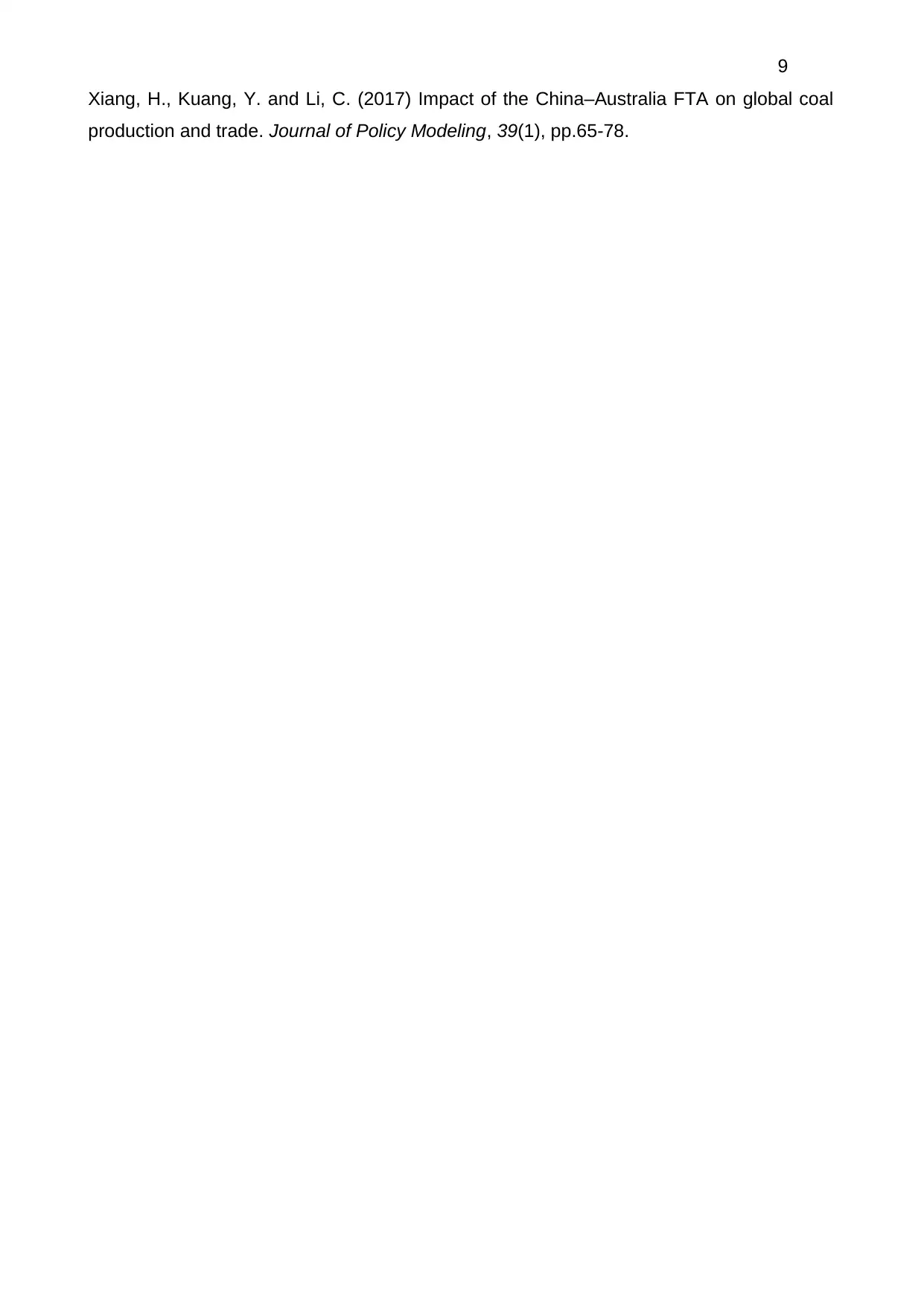
9
Xiang, H., Kuang, Y. and Li, C. (2017) Impact of the China–Australia FTA on global coal
production and trade. Journal of Policy Modeling, 39(1), pp.65-78.
Xiang, H., Kuang, Y. and Li, C. (2017) Impact of the China–Australia FTA on global coal
production and trade. Journal of Policy Modeling, 39(1), pp.65-78.
1 out of 10
Related Documents
Your All-in-One AI-Powered Toolkit for Academic Success.
+13062052269
info@desklib.com
Available 24*7 on WhatsApp / Email
![[object Object]](/_next/static/media/star-bottom.7253800d.svg)
Unlock your academic potential
Copyright © 2020–2026 A2Z Services. All Rights Reserved. Developed and managed by ZUCOL.





